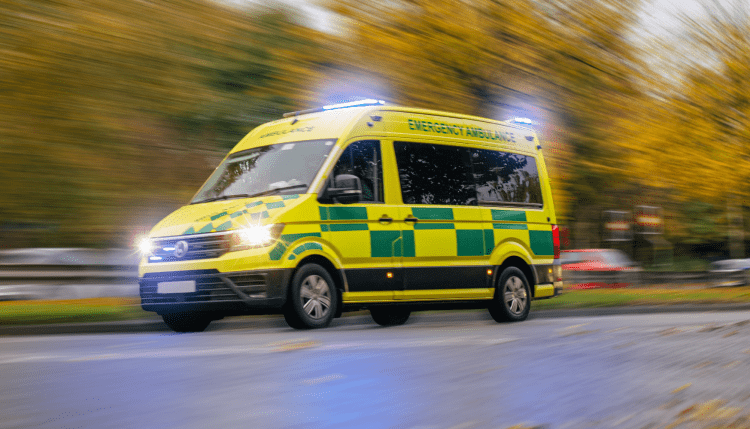
Why I became a student paramedic
 Mia Collins is a second year Paramedic Science BSc(Hons) student.
Mia Collins is a second year Paramedic Science BSc(Hons) student.
We caught up with her to find out how she’s getting on and why she chose her degree.
Why I became a student paramedic
Deciding to train as paramedic wasn’t a straightforward decision. I knew I wanted to be in healthcare but what that looked like for me I wasn’t sure for a long time. I did so much research on sectors like nursing and nothing seemed to feel right for me.
Then my mum broke her leg in the middle of a forest and of course, paramedics came to the rescue! I had a long conversation with one of the paramedics and I realised that I needed excitement and variation in my work.
I love that as paramedics you have such an array of skills and knowledge, while having the excitement of never knowing what you are turning up to. It felt so right for me to study to become a paramedic as the requirement to be a people person, to be passionate, excited to make a difference and one on one patient care was absolutely my cup of tea.
I found it so attractive that you only have one patient, and you focus on them until you have completed your treatment plan. It allows you to be your best and gave the most focussed patient care.
My cohort
My fellow students on the course are amazing. There are only about 50 of us, which means we all know each other quite well and we are all quite similar – to be a paramedic I think you have to be a certain type of person so we all get on so well.
We support each other after difficult shifts, have great nights out and study together too. We have created a really supportive, friendly environment.
My studies
At uni, we have clinical days where we practise practical skills such as BLS or cannulation. We have equipment such as mannikins, life packs, fake arms and cannulating needles. These reflect the best they can to the real world in placement.
Of course, it cannot be perfect to reflect the real world but it gives us a really good practice to prepare us. Simulation practise enables you to feel more confident in your ability and the processes of how some things work such as BLS. It’s also super fun to get to practise with all the equipment in a non-pressure environment. I would actually say that quite often it is easier in real life!
Although my studies can be challenging and can take a lot of time to get my head around, it is all made worth it when you get to be on placement. We are on the ambulance twice a week, so we get to experience our future job right now! It also means that we can practise things we learn in both theory and clinical uni sessions which is really good for reinforcing our learning.
There are of course pros and cons to any degree, and Paramedic Science is no different.
Being on placement
My first day on placement I’ll be honest I was really nervous!!
I didn’t know what to expect and I felt completely like a fish out of water. However, once I was on base and had met my mentor, I felt a lot calmer.
I knew there were no expectations on me to know everything and I could just find my feet for the first few shifts. I ended up having a big job as my very first call, but I was reassured and everyone around me were so kind and explained everything as we went!
The paramedics on the road are genuinely so kind and have all been in your position once so know how you feel!
I learnt very quickly not to be afraid to ask questions about what is going on. Most paramedics are happy to explain things as they do it, and it’s much easier to learn as you go asking what equipment is, what someone is doing than try and ask later on when it’s not in front of you.
My advice to future students
My biggest piece of advice for people thinking about applying to this course is to get work experience. It doesn’t have to be any sort of emergency care but gain some experience in caring for people.
It can help you figure out if it is for you – pushing yourself to be confident in speaking to anyone and experiencing the role of being a care giver. It can help you understand your strengths and weaknesses before you start the course so you can work on your limitations to make you the best clinician you can be. It also creates self-awareness which is so important as a student paramedic to make sure you’re always aware of how you can improve. Work experience is also really appealing to the university in your application!
Find out how you can become a student paramedic with the University of Brighton.